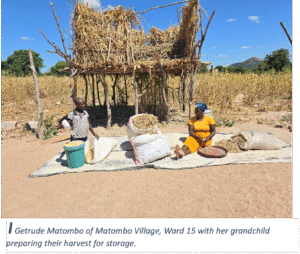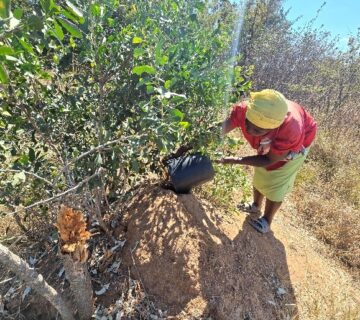Getrude Matombo recalls the last time she had almost a decent harvest as she has now, was 3 years ago. A hardworking 50-year-old mother of 4 who is housing 14 grandchildren is ecstatically celebrating her harvest as she narrates that it is going to be at least 6 months before she may consider relieving on casual labour to nourish her food basket.
 Getrude had relied on casual labour for her food basket, a lifeline in tough times. For this season it was thanks to the abundance of rain and to the Tsungai Project for provision of high-quality seed varieties, her fields were made colorful which was something she last experienced in 2021. Among the crops she grew were cowpeas, groundnuts, and sorghum alongside a good yield of pearl millet.
Getrude had relied on casual labour for her food basket, a lifeline in tough times. For this season it was thanks to the abundance of rain and to the Tsungai Project for provision of high-quality seed varieties, her fields were made colorful which was something she last experienced in 2021. Among the crops she grew were cowpeas, groundnuts, and sorghum alongside a good yield of pearl millet.
Tsungai Project, is currently providing life-saving humanitarian assistance to meet emergency food security and water, sanitation, and hygiene (WASH) needs of affected people by drought in Gutu District.
“I had no seeds at all this season. Considering last season, we did not harvest anything, so we had no seeds to plant in the fields,” she emphasized. “Purchasing seeds was not even an option for us, as we could not afford to buy them. No household was willing to trade casual labor for seeds, since we all faced the same problem of poor harvests, leaving others with little to no seeds to spare,” she explained.
Due to the excess in her current harvest she reintroduced pearl millet porridge into her family’s diet, a staple she treasures since she has 9 infants’ grandchildren. As she tended to the crops, she anticipated about nine and a half buckets of unshelled cowpeas and four buckets of groundnuts. The pearl millet and sorghum did well, each crop offering a chance to a good meal. However, her finger millet did not do so well but she is still grateful for the options she has from the other crops.
With a large family to feed, Getrude felt the weight of responsibility. Before the harvest, she could afford only one meal a day, but now, with a bountiful yield on the horizon, she looked forward to at least two meals a day for the next six months. She appreciated the difference that using various agriculture techniques they were taught by Tsungai such as the proper use of basin holes and planting methods which made her crop survive.
Looking ahead, Getrude was excited at the prospect of trading some sorghum and pear millet for sweet potatoes, adding variety to their meals. She felt gratitude for the training that equipped her with knowledge and information and skills for improving her crop productivity. The seeds they had got were not just high-quality; they were a promise of sustainability as they are getting seed, they can re-use for at least 3 years.
Getrude is thankful for the interventions brought by the Tsungai Project. She looks forward to mastering the concepts they were taught to sustainably have food security in her household.


No comment